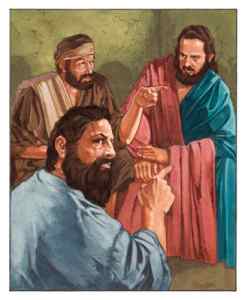Sunday: The Recurring Call to Justice
Despite God’s clearly detailed plan for the Israelite nation, the Israelite people rarely lived up to their calling. Not many generations after they were established in the land, they asked Samuel, the prophet and judge, to appoint a king to lead their nation, “such as all the other nations have” (1 Sam. 8:5, NIV).
Read 1 Samuel 8:10-18. What was Samuel’s warning to the people in response to their request for a king?
Samuel recognized this as a step toward being like the other nations in other ways, as well. While Samuel sought to counsel the first king, Saul, it was not long before his prophecy began to become reality. Even at the height of the Israelite kingdom, David and Solomon did not escape the temptations, corruption, and excesses of their power.
Throughout the reigns of the kings of Israel and Judah, one of God’s responses was to send prophets to speak His will and to remind the Israelite leaders and people of their God-given responsibilities to the forgotten members of their society.
In the writings of the Hebrew prophets, we see a continuing and recurring call to live justly and to do justice in society. Confronting the unfaithfulness of Israel and its leaders, the prophets were a regular and urgent voice for the voiceless, particularly those who were hurt by Israel’s failure to follow God’s will.
Reflecting on the passion of the Old Testament prophets, Abraham Joshua Heschel contrasts our complacency with their urgent calls for justice: “The things that horrified the prophets are even now daily occurrences all over the world … Their breathless impatience with injustice may strike us as hysteria. We ourselves witness continually acts of injustice, manifestations of hypocrisy, falsehood, outrage, misery, but we rarely grow indignant or overly excited. To the prophets even a minor injustice assumes cosmic proportions”. – The Prophets (New York: Jewish Publication Society of America, 1962), pges 3, 4.
What these prophets offer us is an insight into the heart and mind of God. Speaking on behalf of God, they can help us see the injustice and suffering of our world through God’s tear-filled eyes. But this passion is also a call to action, to work with God to relieve and remedy the oppression and sorrow of those around us.
| How do we sometimes seek to be like “all the other nations” in ways that might be harmful to us and others? |


God warned the people of Israel the King of Israel would take away everything belonged to them, sons, daughters, slaves, fields and livestock.
It’s very interesting God specifically mentions tenth. If we recall tenth belonged to the Lord by asking for a king the Israelite will pay homage to the Israelite king.
We can see that even today. God says, remember My sabbath day. The world says worship me on my day and the whole world wondered after the beast.
What if the son’s of Samuel were obedient and led the people of Israel in righteousness? What kind of history would have unfolded?
It is a solemn reminder those in authority have a responsibility to lead the people in righteousness.
The son’s of Samuel contributed to the Israelite in asking for a king. It reminds us our focus and trust should be in the Lord.
Envy means “a feeling of discontented or resentful longing aroused by someone else’s possessions, qualities, or luck.” This is such a basic and powerful drive. If we allow ourselves to be led by true love (for self and others, a Christ’s type of Love) the emotional root to envy is cut off. Better be full of positive feelings!
In keeping with the theme and structure of this week’s lesson, one would re-name Sunday’s lesson ‘Samuel’. Samuel the Priest, Samuel the Prophet and Samuel the Judge.
One of the notable notes is that, while forsaking the leadership of God, the Israelites had asked for the formation of a new institution altogether, the monarchy. Ironically, the demand for a king emerged against the background of Samuel’s leadership which was characterized by justice, equality, fairness, ethics, prosperity, etc. The era of Samuel is described as one of the most prosperous for the nation of Israel, however he does not cut out as famous for such an achievement because we are talking about the prosperity of Israel as a collective. Had he built hanging gardens that were of no consequence to the ordinary citizens, he was going to go down in the books of history as one of the greatest.
Back to the core of the topic: as laid out in 1 Samuel 8: 10 – 18, the man of God warns the Israel nation of the misery and ills the monarchy would bring, including unprecedented exploitation and heavy taxation at the hands of one of their own. This was self-inflicted misery.